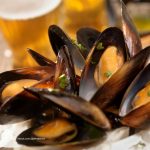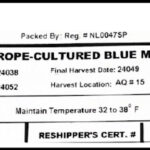Paralytic shellfish poisoning (PSP) has sickened at least 20 people after eating mussels harvested between the Washington border and Seal Rock State Park, according to the Oregon Health Authority. Anyone who harvested mussels from Short Beach near Oceanside, Hug Point, and near Seaside should immediately discard them. Only recreationally harvested mussels are problematic. This warning does not apply to mussels that were harvested commercially and purchased at a grocery store or a restaurant. PSP is caused by saxitoxins that are produced by marine algae. People get sick by eating shellfish contaminated with this naturally occurring biotoxin. Shellfish that can be contaminated with this toxin include scallops, clams, mussels, cockles, and oysters, along with some types of fish and … [Read more...]
Mussels From Allen’s Fisheries Associated With Outbreak in NJ
FDA has issued a warning about certain mussels from Allen's Fisheries in Benoit's Cove, Newfoundland, Canada, that are associated with an outbreak in New Jersey. The pathogen or biotoxin that allegedly caused this outbreak has not been named, and the number of patients, their ages, illness onset dates, and whether or not anyone has been hospitalized was not mentioned in the alert. The product tag above is representative of the labeling that would accompany the mussels. The mussels are from Allen's Fisheries (NL0047SP) in Newfoundland, Canada, harvested on 2/07/2024 (Julian date 24038), from harvest area AQ # 15 Newfoundland, with final harvest date of 2/18/2024 (Julian date 24049). The mussels were shipped to distributors in the states of Connecticut, Florida, Maryland, … [Read more...]
Cultured Mussels From East River Shellfish Recalled For Pathogens
The FDA is warning restaurants and food retailers not to sell cultured mussels from East River Shellfish because they may be contaminated with E. coli and Salmonella bacteria. East River Shellfish is located in Glenfinnan, Prince Edward Island in Canada. The restaurants that received these mussels are located in the states of Illinois, Massachusetts, and New York. The cultured muscles are from the harvest location PE 4-C, and were harvested on August 14, 2023. They were shipped to customers on August 1, 2023, and distributed to retailers in those states mentioned. The product tag that was attached to original containers is: Contaminated mussels can cause illness if eaten raw or undercooked, especially in people who have chronic illnesses and compromised immune systems. Food … [Read more...]
Alaska Death From PSP Triggers Warning From Health Officials
An Alaska death from PSP triggers a warning from health officials in that state. Paralytic shellfish poisoning (PSP) occurs when a person is exposed to paralytic shellfish toxin. This is the first known PSP fatality in that state since 2010, although serious illnesses are reported more often. Since 1993, there have been four cases of PSP deaths in Alaska: one in 1994, one in 1997, and two in 2010. During that same time frame, there have been more than 100 cases of paralytic shellfish poisoning in that state. The person who died ate blue mussels and snails that were collected from a Dutch Harbor beach on July 4, 2020. The shellfish were cooked first; like most toxins, PSP is not rendered inactive by heat. The person did have underlying health conditions that contributed to … [Read more...]
Oxycodone Traces Found in Puget Sound Bay Mussels
Traces of oxycodone have been found in Puget Sound mussels, according to research from the Puget Sound Institute. The native bay mussels were harvested from the Seattle and Bremerton area harbors. These shellfish were part of the state's Puget Sound Mussel Monitoring Program. Scientists at the Washington Department of Fish and Wildlife transplant uncontaminated mussels from an aquaculture source on Whidbey Island to different locations in Puget Sound to help them study levels of pollution. Mussels, like other shellfish, are filters feeders, so they concentrate chemicals, bacteria, and other contaminants from the environment into their tissue. After a few months, the mussels are collected, and scientists analyze the contaminants. The areas where the tainted mussels were … [Read more...]






